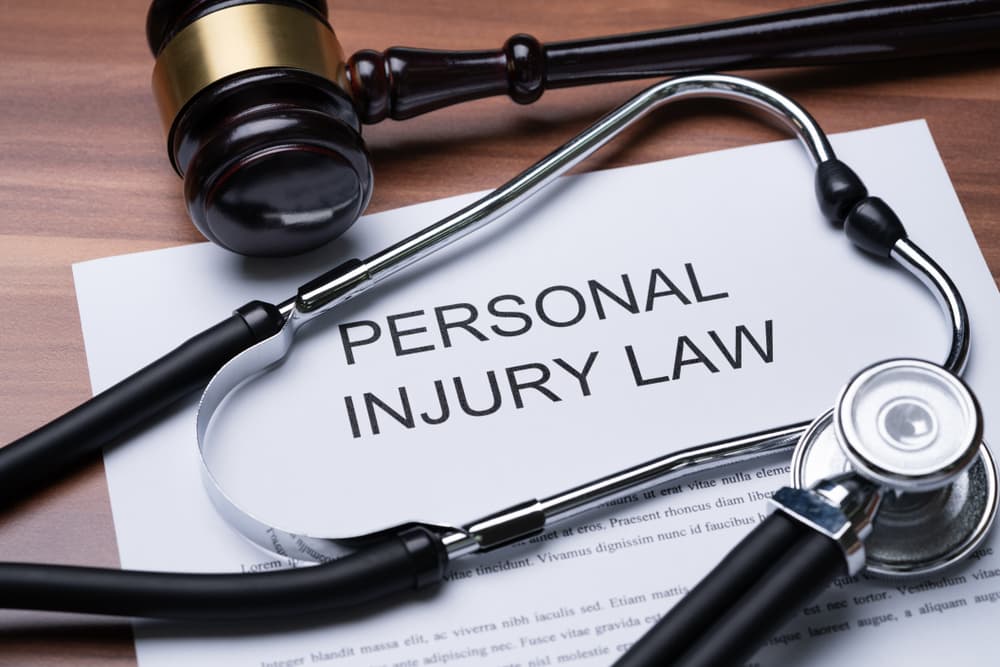Personal injury claims can be daunting. Car accidents, slip and falls, and other accidents caused by others can instantly disrupt your life. However, you have important legal rights to seek compensation. Understanding how to calculate how much compensation you deserve is necessary to ensure you receive fair recovery for your losses. This is where personal injury calculators come into play.
You should never rely on online calculators or those insurance companies offer to you, as they will not take all relevant circumstances and factors into consideration. Always consult a personal injury attorney to accurately calculate your losses.
Schedule a Free Initial Consultation Today!
Types of Damages in Personal Injury Claims

In personal injury claims, damages fall into two main categories: economic and non-economic. The law entitles you to compensation for both types of damages as they apply to your injury claim.
Economic Damages
Economic damages compensate for tangible losses that are quantifiable in monetary terms. These damages typically include medical expenses, lost income, and property damage.
Medical expenses are among the most significant economic damages in personal injury claims. This includes costs of emergency care, hospitalization, surgery, medication, rehabilitation, and other medical treatments necessary for recovery. These expenses can quickly add up, particularly for severe injuries or long-term medical care.
Lost income is another important component of economic damages. When an injury prevents you from working or requires time off for recovery, you may be entitled to compensation for the income you did not earn during that time. This includes income lost due to missed work days and any future earning potential that may be affected by the injury.
Property damage is relevant in cases where your personal property sustained damage due to someone else's negligence. This can include damage to your vehicle in a car accident or your home or belongings in other incidents. Economic damages include the cost of repairing or replacing the property.
Non-Economic Damages
Non-economic damages are intangible losses that do not have a specific monetary value but are equally important for compensating the victim for the effects of their injuries. These damages typically include pain and suffering, emotional distress, and loss of consortium.
Pain and suffering refers to the physical and emotional distress experienced due to the injury. This includes the immediate pain due to the incident and any ongoing discomfort, disability, or limitations on daily activities. Assigning a monetary value to pain and suffering can be challenging, as it is subjective and varies from person to person.
Emotional distress covers the psychological impact of the injury, such as anxiety, depression, fear, or post-traumatic stress disorder (PTSD). Experiencing a traumatic event can have lasting effects on mental health, and compensation for emotional distress aims to address these non-physical effects of an injury.
Loss of consortium refers to the injury's negative impact on the victim's relationships with their spouse or close family members. This can include loss of companionship, affection, or intimacy and any disruptions to family life or responsibilities due to the injury.
How Lawyers Calculate Damages
When you've suffered an injury due to someone else's negligence, navigating the legal process to seek compensation can be overwhelming. Determining the damages owed to you is one of the most critical aspects of this process. Lawyers play a key role in this process, employing various strategies and methods to calculate damages accurately. You cannot trust an insurance company’s calculations, so you need a trusted attorney performing this task for you.
Gathering Evidence and Documentation
The first step in calculating damages is gathering evidence and documentation related to your injuries. This includes medical records, bills, and receipts for all expenses incurred due to the injury. Your lawyer will carefully review this documentation to understand the extent of your injuries and treatment.
Assessing Medical Records and Bills
Once your lawyer collects all relevant documentation, they will assess your medical records and bills to determine the total cost of your medical treatment. This includes expenses such as hospital stays, surgeries, doctor's visits, medication, and rehabilitation. Additionally, your lawyer will consider any future medical expenses you may incur due to your injuries. They may consult with medical experts to estimate future medical expenses.
Evaluating Lost Income and Future Earning Potential
In addition to medical expenses, your lawyer will evaluate your lost income due to time off work to recover from your injuries. This includes income lost from missed work days and any future earning potential affected by your injury. Your lawyer will consider factors such as your occupation, salary, and career advancement opportunities to calculate the full extent of your lost income.
Factoring in Non-Economic Damages
Calculating non-economic damages requires a different approach, as these losses are subjective and difficult to quantify. Your lawyer will consider factors such as the severity of your injuries, the effects they've had on your quality of life, and any emotional distress or trauma you've experienced.
Considering Punitive Damages (if Applicable)
In cases where the defendant's actions were particularly egregious or reckless, courts might award punitive damages. Courts impose punitive damages to punish the defendant for their misconduct and deter others from engaging in similar behavior in the future. Your lawyer will assess the circumstances of your case to determine whether punitive damages may be available and, if so, how to pursue them.
Challenges in Calculating Damages
While calculating damages in personal injury claims is essential for ensuring fair compensation for victims, it has its challenges. Several factors contribute to the complexity of this process, including the subjective nature of non-economic damages and the varying standards used to assess them. Additionally, the availability and reliability of evidence can vary, posing challenges in accurately quantifying certain types of damages. Therefore, personal injury lawyers must approach these calculations effectively to advocate for their client's rights and secure appropriate compensation.
Subjectivity
One of the primary challenges in calculating damages is the subjectivity of non-economic losses. Unlike economic damages, which can be quantified in monetary terms, non-economic damages such as pain and suffering, emotional distress, and loss of consortium require subjective assessment.
Each injury victim experiences these losses differently, making assigning a specific dollar value to them inherently difficult. As a result, determining an appropriate amount for non-economic damages necessitates an understanding of the victim's unique circumstances and the traditionally accepted calculation methods that insurance companies and courts acknowledge.
For example, when calculating pain and suffering, there are two methods insurance companies might use as personal injury calculators:
- The per diem method
- The multiplier method
If you have serious injuries, the multiplier method will likely be more appropriate to reach an accurate value for pain and suffering. However, insurers might try to reduce the claim’s value by using the per diem method. Your personal injury attorney will use the proper method that results in the accurate compensation amount to demand from insurance companies.
Future Potential Earnings
Changes in future earning potential present another challenge in calculating damages. A serious injury can have long-term implications for a victim's ability to work and earn a living. This may include reduced earning capacity, career advancement limitations, or permanent disability. Predicting future income losses requires careful consideration of various factors, including the victim's occupation, education, skillset, economic trends, and market conditions. Expert analysis is often necessary.
Insurance Company Obstacles
Furthermore, insurance company tactics aimed at minimizing payouts challenge accurate damage calculation. Insurance adjusters may dispute the severity of the injury, the necessity of certain medical treatments, or the extent of the victim's losses to reduce the compensation offered. This only emphasizes the importance of having a skilled personal injury lawyer who can effectively counter these tactics and ensure you receive the full and fair compensation you deserve.
The Limitations of Personal Injury Calculators
Personal injury calculators have become increasingly prevalent tools for individuals seeking to estimate potential compensation for their injuries. While these online calculators may seem convenient at first glance, they have significant limitations that can impact their reliability and accuracy, especially given the complications inherent in personal injury cases.
Predetermined Formulas
One of the primary limitations of personal injury calculators is their lack of individualized assessment. These calculators typically rely on predetermined formulas or algorithms based on general principles of personal injury law. As a result, they cannot consider the specific circumstances of each case, such as the impact on the victim's life and any contributing factors or mitigating circumstances. This lack of personalization can result in inaccurate or misleading estimates that fail to reflect the unique aspects of a particular case.
For example, if you suffered a spinal cord injury, you might have lifelong pain and suffering. However, a calculator likely will not accurately represent your damages because it cannot understand the extent of the injury’s lasting effects. Its algorithm may not factor in issues such as the long-term pain you will experience or the emotional impact of no longer participating in your favorite activities.
Case Challenges
Furthermore, personal injury calculators cannot consider all factors influencing a claim's value. Personal injury cases are often challenging, involving numerous variables and considerations that can affect the outcome.
Factors such as liability issues, negligence, pre-existing conditions, and future medical expenses may all play a significant role in determining the value of a claim. However, personal injury calculators often oversimplify or completely ignore these complexities, resulting in estimates that fail to capture the full scope of the damages owed to the victim.
Personal injury claims also must consider detailed medical evidence and factual disputes that require careful analysis and evaluation. However, personal injury calculators typically use basic inputs such as past medical bills and lost income figures to generate estimates, ignoring the nuances of the legal and factual issues. As a result, these calculators provide misleading or inaccurate estimates that fail to account for many losses in a particular case.
Differences Among Personal Injury Calculators
Finally, there can be significant discrepancies between different personal injury calculators. Each calculator may use different formulas, algorithms, or input variables to generate estimates, resulting in widely varying results for the same case. This inconsistency undermines the reliability and credibility of personal injury calculators for estimating potential compensation.
Instead of turning to the internet, turn to an experienced personal injury attorney for assistance.
Why Consulting a Personal Injury Lawyer is Essential

Consulting a lawyer is essential when pursuing a personal injury claim. Whether you've suffered an injury in a car accident, slip and fall, or any other incident due to someone else's negligence, a skilled attorney can provide invaluable guidance and support throughout every stage of your case.
Experience
One of the primary reasons why consulting a lawyer is so important in personal injury claims is their experience handling such cases. Personal injury law is complex and constantly evolving, with issues that may be difficult for victims to address independently. A knowledgeable attorney understands the legal principles and procedures governing personal injury claims and can leverage this experience to build a strong case on your behalf.
Accurate Damages Assessment
Furthermore, a lawyer can accurately assess the damages you owe and ensure you receive fair compensation for your injuries and losses. This includes economic damages such as medical expenses, lost income, property damage, and non-economic damages such as pain and suffering, emotional distress, and loss of consortium. By carefully evaluating your case and gathering evidence to support your claim, a lawyer can maximize the value of your compensation and seek the full extent of your losses.
Negotiation Skills
Additionally, a lawyer has negotiation skills to fight for a favorable settlement from the insurance company or opposing party. Insurance companies are notorious for employing tactics to minimize payouts, such as offering lowball settlement offers or disputing the validity of your claim. An experienced personal injury attorney can negotiate with the insurance company to ensure you receive a fair settlement offer that fully compensates you for your injuries and losses.
Guidance and Support
Moreover, a lawyer can provide invaluable legal guidance and support throughout the claims process. From handling paperwork and communications with insurance adjusters to representing you in court if necessary, an attorney can alleviate much of the stress and burden of pursuing a personal injury claim. They can answer your questions, address your concerns, and keep you informed about the progress of your case every step of the way.
Never wait to seek a free consultation with a personal injury attorney to begin the process today.
Schedule a Free Initial Consultation Today!
